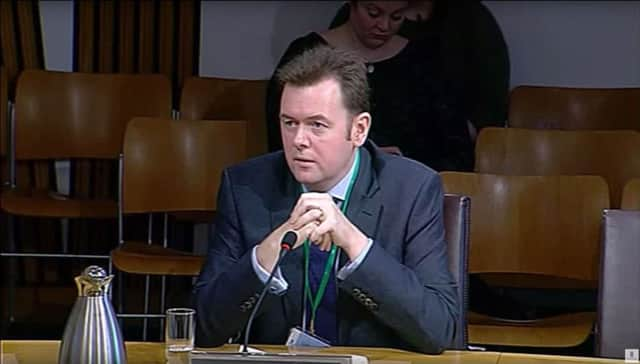Low earners fared better in recession - CBI chief


Neil Carberry of the Confederation of British Industry (CBI) was branded “flat wrong” and accused of failing to grasp the “scale of inequality” in society, as he appeared before MSPs yesterday.
Bosses of the world’s leading firms have recently seen earnings jump to an average £5 million a year.
Advertisement
Hide AdAdvertisement
Hide AdThe controversial comments came as Holyrood’s economy committee yesterday took evidence on wage levels in Scotland.
Mr Carberry said: “We have just had the first recession ever where the bottom 10 per cent of earners did better than the rest. Typically, they do a lot worse.
“That’s a great success of the (minimum wage) policy that is being pursued.”
But Green MSP Patrick Harvie said the past five years have seen the minimum wage go up by just 38p an hour for 18-year-old workers and 77p an hour for workers over 21.
“If they are working full-time that week, that will be something like £1,500 a year,” he said.
“The average pay of CEOs in the FTSE 100 has gone from £4.1 million to £5 million in that time.
“Are you really telling me that the lowest earners have seen their pay increase by more than the highest earners?”
Mr Carberry said: “I was making the point about 30 million people, not 80 people, and the point I was making was that the bottom 10 per cent of the labour market had higher rates of pay increase over the last few years than the other deciles.”
Advertisement
Hide AdAdvertisement
Hide AdMr Harvie said: “Can I just ask you to reflect on that statement which is not only flat wrong but offensive to the people at the bottom of the pile.”
The MSP said afterwards: “Too many Scots work in jobs that still leave them in poverty, yet the CBI has a track record of lobbying for fat cats and has consistently failed to grasp the scale of inequality in today’s economy.”
Mr Carberry said raising the minimum wage “does not necessarily benefit the poorest”.
He added: “A lot of businesses were deeply frustrated by the argument that tax credits subsidise low wages.
“Firstly, because businesses don’t know what the benefits of their employees are, nor should they ever do so. And secondly, only 40 per cent of people on the absolute minimum national wage receive any tax credits at all because they live in households with higher earners, and these issues need to be taken into account when setting wage policy.”
He added: “The government should pull out of the system things that discourage people from working full time.
“There is clearly some feedback towards the lower end of the pay scale where people will turn down promotions, turn down more hours, because of the effects on benefits they get.”
He said the flexibility of zero-hours contracts should be a “win win” for employers and workers.
Advertisement
Hide AdAdvertisement
Hide Ad“There will always be a portion of the labour market that need to be flexible to allow companies to try new things and respond to demand,” he said.
“And there is a mirroring demand in that - most people on zero-hours contract report that they are perfectly happy with their arrangement.
“I know that there are abuses but we should remember that many, many workers’ experience of the flexible labour market is a positive one.”